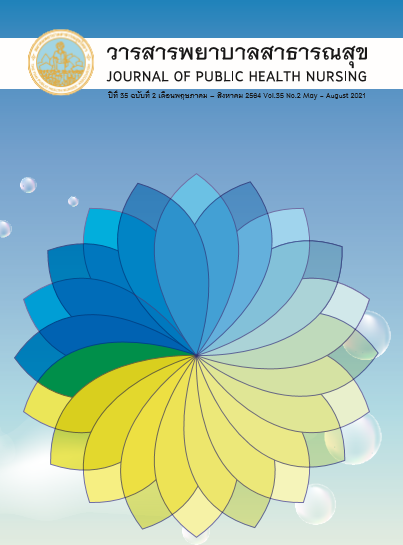Developing and Evaluating OSCE-based, Comprehensive Clinical Competency of Nursing Students, Srimahasarakham Nursing College
Keywords:
Comprehensive clinical competency, OSCE, Nursing studentAbstract
Objective Structured Clinical Examination (OSCE) can help to improve clinical skills and prepare students for practice in clinical settings. This action research aimed to develop and evaluate the OSCE-based comprehensive clinical competency of nursing students at Srimahasarakham Nursing College. The participants consisted of 371 nursing students and 50 nursing instructors. The research process was conducted in four phases: 1) planning, 2) acting, 3) observing, and 4) reflecting. Instruments included an OSCE evaluation, a questionnaire to measure student satisfaction with OSCE tests, and after-action review (AAR). The study was carried out from October 2017 to December 2019. The data were analyzed using descriptive statistics and content analysis.
Instructors evaluated OSCE-based, comprehensive clinical competency in real-time at 14 stations. Results indicate that knowledge and skill competencies of nursing students were good or higher (60 %) in areas including CPR (100 %), vaccine injection (92 %), normal labor (94.89 %), child growth and development (88.83 %), visual acuity test (91.24 %), and physical examination (62.69 %). The students expressed reasonable satisfaction with the OSCE evaluation ( =3.88, SD 0.47). They feel excited about the test and feel confident about caring for patients after graduation. The college should adopt this testing practice and support an OSCE comprehensive clinical competency evaluation tangibly and continuously.
References
Office of the Higher Education Commission (OHEC). Thai Qualifications Framework for Higher Education (TQF: HEd). Bangkok: Office of the Higher Education Commission; 2009.
Harden RM, Stevenson M, Downie WW, Wilson GM. Assessment of clinical competence using objective structured examination. British Medical Journal 1975; 1(5955): 447-51.
Harden RM. What is an OSCE? Medical Teacher 1988; 10(1); 19–22. doi: 10.3109/01421598809019321
Praboromarajchanok Institute (PI). Objective Structured Clinical Examination (OSCE). Nonthaburi: Yuttarin printing; 2016.
Srimahasarakham Nursing College. Bachelor of Nursing Science Program (2012 revised edition). Mahasarakham: Srimahasarakham Nursing College; 2012.
Nursing and Midwifery Council. Standards for Pre-registration Nursing Education. London: NMC; 2010.
Lynga P, Masiello I, Karlgren K, Joelsson-Alm E. Experiences of using an OSCE protocol in clinical examinations of nursing students - A comparison of student and faculty assessments. Nurse Education in Practice 2019; 35: 130-4.
Bani-issa W, Tamimi M, Fakhry R, Tawil HAl. Experiences of nursing students and examiners with the Objective Structured Clinical Examination method in physical assessment education: A mixed methods study. Nurse Education in Practice 2019; 35: 83-9.
Villegas N, Cianelli R, Fernandez M, Hendersona S, Sierraa S, Alfonsoa Y, et al. Assessment of breastfeeding clinical skills among nursing students using the Objective Structured Clinical Examination (OSCE). Investigación en educación médica 2016; 5(20): 244-52.
Liu G, Fei S, Ge W, Xu J, Cha Y, Wang X. Application of Objective Structured Clinical Examination (OSCE) in Intensive Care Curriculum. Advances in Social Science, Education and Humanities Research 2019; 311: 307-12.
Kemmis S, McTaggart R (ed.). The action research planner. Victoria: Deakin University; 1988.
Iramaneerat C. Suggestions for the OSCE (Objective Structured Clinical Examination) (Part 1) [Internet]. 2018 [cited 2018 Oct 3]. Available from: http://teachingresources.psu.ac.th/document/2548/Ai_Rommani_Rat/2.pdf
Lohapaiboonkul N, Palakarn B. The Effects of an Objective Structured Clinical Examinations (OSCEs) Test to evaluate the knowledge and clinical skills in basic medical treatment and perceive of preceptors from community of the clinical skills of nursing students. Nursing Journal of the Ministry of Public Health 2014; 23(3): 24-34. (in Thai)
Lejonqvist GB, Eriksson K, Meretoja R. Evaluating clinical competence during nursing education: A comprehensive integrative literature review. International Journal of Nursing Practice 2016; 22(2): 142-51.
Smrekar M, Ficko SL, Hošnjak AM, Ilic B. Use of the Objective Structured Clinical Examination in Undergraduate Nursing Education. Croat Nurs J 2017; 1(1): 91-102.
Soivong P, Lasuka D, Chaiard J, Khampolsiri, T, Phothikun R, Kiatwattanacharoen S. Development and feasibility of the OSCE-based medical nursing comprehensive practice achievement test for senior nursing students. Thai Journal of Nursing Council 2014; 29(4): 79-91. (in Thai)
Downloads
Published
How to Cite
Issue
Section
License
บทความที่ตีพิมพ์และแผนภูมิรูปภาพถือเป็นลิขสิทธิ์ของวารสารพยาบาลสาธารณสุข (Thai Public Health Nurses Association)







